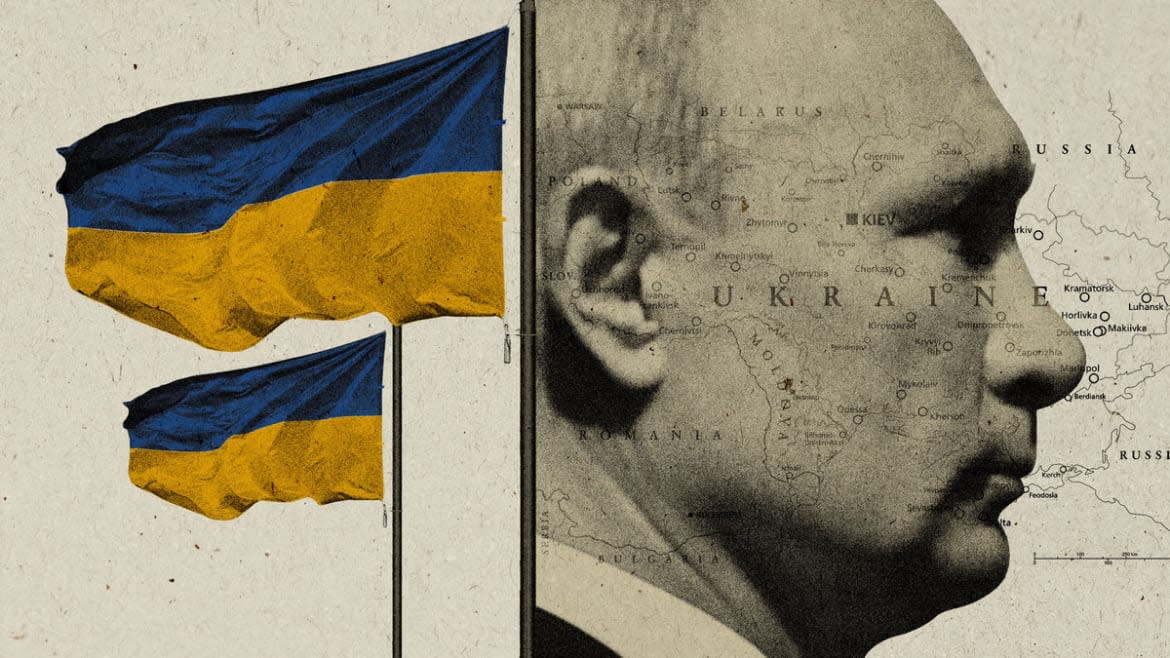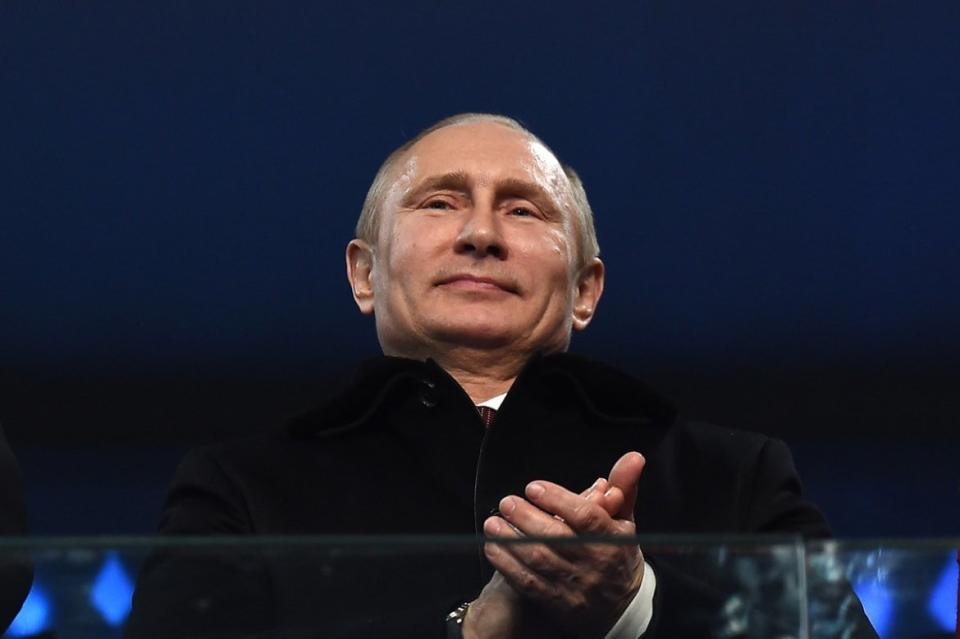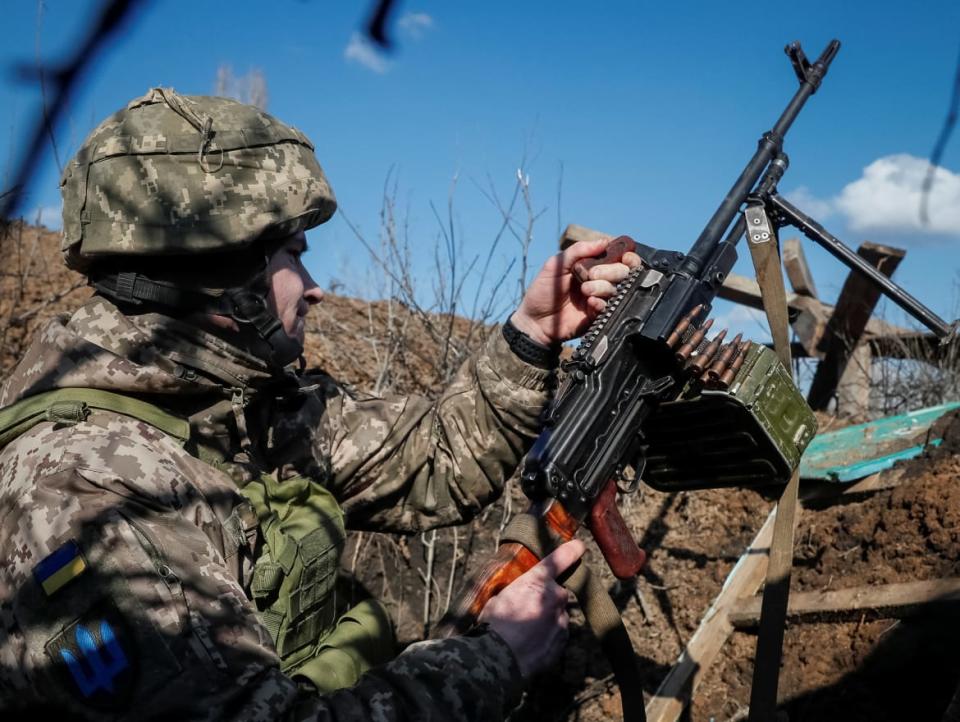Ukraine Invasion by Russia Is the Beginning of the End for Putin and His Friends

- Oops!Something went wrong.Please try again later.
Five a.m. local time in Ukraine on Thursday, Feb. 24, 2022, the moment the Russian military launched its unprovoked, indefensible full-scale invasion of the largest country in Europe, marked the beginning of the end for Vladimir Putin.
The attack, which even in its first few hours has taken a devastating toll on Ukraine and its people, also will be seen as a turning point in the careers of those who supported Vladimir Putin—from the oligarchs now scrambling to keep their superyachts from being seized to cynical America political leaders who have since 2016 offered a chorus celebrating and defending the Russian president.
Despite his past crimes and abuses, Putin has somehow managed for two decades to be seen as something less than the threat he really was. He was largely accepted at the head tables of the world’s elite, even after he murdered and imprisoned his critics, stole vast fortunes from the Russian people. He spoke at the Munich Security Conference in 2007 and effectively rejected the post-World War II international order… and still the invitations kept coming. After he ordered the invasion of Georgia in 2008, he received a slap on the wrist from the international community but maintained his role attending international summits and hosting dignitaries.
Putin hosted the Olympics in 2014, shortly before he invaded Ukraine for the first time and seized Crimea. That cost him his G7 Summit privileges but still he was embraced by world leaders and business moguls as though he were a leading citizen of the world in good standing.

Vladimir Putin at the Sochi 2014 Winter Olympics just before Russia invaded Crimea.
Putin preened and posed beaming as Russia hosted the FIFA World Cup beginning in June 2018. Although the U.S. intelligence community unanimously concluded Putin had interfered in U.S. elections in 2016, in the midst of the World Cup festivities, Putin welcomed a delegation of Republican senators on July 4, 2018. Less than two weeks later, he met with the U.S. president he explicitly sought to help elect—Donald Trump—in Helsinki. At this meeting, Trump fawned over the Russian leader and when asked whether he believed Putin or his own intelligence community about the election, Trump said, deferentially, “President Putin says it’s not Russia. I don’t see any reason why it would be.” Sen. John McCain called it a “disgraceful performance” and said, “No prior president has ever abased himself more abjectly before a tyrant.”
If Putin Pursues ‘Grey Zone’ Tactics in Ukraine, He’ll Be Tough to Stop
U.S. leaders were not alone in succumbing to the lure of Putin and the corrupt interlocking empire of businesses he controlled—and used to gain influence globally. Former German officials, led by ex-Chancellor Gerhard Schroeder, and top German business people flocked to work for companies close to Putin. Other European leaders followed suit with jobs at key energy companies like Lukoil and Gazprom. Poisoning enemies, tossing them off of balconies, or imprisoning them, these things were just not enough to compromise Putin’s standing.
Just this week, former President Trump praised Putin for his “genius.” Fox News broadcast Russian talking points to its loyal, which is to say, gullible audiences across America. A month ago former Secretary of State Mike Pompeo called Putin “talented,” “savvy,” and a “statesman.”
For years, Putin was the ultimate wolf in sheep’s clothing. He was known to be an enemy of democracy, a brutal dictator, and one of the world’s leading kleptocrats (which may well have made him the world’s richest man.) But whether it was the money or the hope that Putin would use his power to help them or their causes, world leaders turned to him. In many Western countries, Putin used that to his advantage, openly cultivating movements that supported his anti-internationalist, anti-NATO, anti-Western agenda not just in the U.S. but in the U.K., France, Italy, Austria, Germany, Hungary, Poland, and the Balkans. He and his oligarch friends supported groups from the NRA to the Brexit movement. To be honest, when it came to sheep’s clothing he barely needed a sweater.
What Happens to Ukraine Matters to Every American
In fact, he became brash enough to do as he did in Munich in 2007 and tell the world over and over again who he really was. At the ultimate club meeting for global insiders, the World Economic Forum meeting in Davos just last year, Putin warned of parallels between the global situation today and that of the 1930s. “Today, such a global hot conflict is, I hope, in principle impossible. But, I repeat, the situation can develop unpredictably and uncontrollably.”
In a lengthy article published in July of last year, Putin laid out his views on Ukraine. He began by saying Russians and Ukrainians were “a single whole.” He then laid out his twisted view of the history of the two countries, a journey more through his own mind than through the past, and concluded, “I am confident that the true sovereignty of Ukraine is possible only in partnership with Russia.”
And yet still, as the current crisis began, such was the prevailing view of the Russian leader, that few believed that Putin, despite past invasions, would ever do something so bold as to attack a European neighbor unprovoked, based on a transparent fabric of lies, regardless of the consequences for the people of Ukraine or, frankly, for the cost to his own troops or citizens. As recently as days ago, when the U.S. government was sharing intelligence that made Putin’s intentions clear, it was pooh-poohed, dismissed by some as an American provocation rather than an insight into the goals of the world’s most dangerous man.
In hours, the scales have fallen from the world’s eyes. All along he showed us who he was and we refused to believe him. For some that was because he did not fit with their preconceptions about the nature of the modern world. For others, it was more of a choice, they believed what they wanted to believe. They saw the Putin that advanced their interests.

A Ukrainian service member on the front line near the village of Travneve in Donetsk region, Ukraine.
Now, he is mentioned in the same breath as the last man to shatter the peace of Europe, Adolf Hitler. Putin, again, even aided in this analogy when he used the same lies to justify his invasion of Ukraine that Hitler had used to justify entering the Sudetenland in 1938. (Hitler lied that Sudeten Germans were being persecuted by the Czechs, Putin said the same of Russians in Ukraine.)
The attack on Ukraine is not on par with carving away at a slice of Georgia. It is not even akin to seizing Crimea. It is an act of aggression on a scale that neither Europe nor the world has seen in eight decades. It came, thanks to Putin’s demented neo-tsarist reverie explaining his actions on Monday night, along with a warning that his vision of Russia includes other countries that were once part of the Russian empire. It was augmented by a threat so heavy-handed and crude that it might be dismissed had it not come from the man who controls the world’s largest nuclear arsenal: “Whoever tries to interfere with us, and even more so, to create threats for our country, for our people, should know that Russia's response will be immediate and will lead you to such consequences that you have never experienced in your history.”
The Putin of Davos cocktail parties who presented himself as just another world leader, a man who should be as admired as he was feared for his cunning and his unflinching use of power, is dead. He was buried in the debris of the first rocket that landed in Ukraine.
Putin will now be seen and treated as the greatest near-term threat to peace the world faces. The man who thought he could exploit the division he helped sow in the West, has now united it. NATO’s forward deployments in countries he threatened will not be withdrawn anytime soon. NATO, which was adrift, has once again found purpose in containing Putin. Europeans who flirted with Russia will no longer do so. Europe will finally start to turn away so they are no longer dependent on Russian energy.
Putin’s opponents in Russia will be empowered. That country’s democracy movement, like those in places like neighboring Belarus whose leader, Alexander Lukashenko, played the role of loyal Putin flunky in the current attack, will be energized. His oligarch friends will pay a high price and if Western sanctions are deep enough and last long enough they will come to resent their association with their capo di tutti capi. The Russian economy, already weak, will also suffer if those sanctions are maintained and, wherever possible, deepened.
Already, Ukraine’s inexperienced almost accidental president, Volodymyr Zelensky, has been elevated by this attack and the role he has played thus far in standing up to it. His speech, directed to his people and those of Russia, was a tour de force, the most humane address any leader has delivered in the course of this crisis. The support his people will get from the West will exceed what was thought possible days ago. It is now understood that the people of Ukraine are fighting for the rule of law, for democracy, and for the world order. If they suffer early defeats, the movement to ultimately restore what the Russians are trying to take from them will have a long list of active donors and supporters from across Europe, the U.S., and around the world. And each victory they win at any stage of this conflict will be seen not as a defeat of Russian forces but of Putin himself.
Even Putin’s supporters in the West will realize that their embrace of him will be their undoing. Pictures will emerge of Russian atrocities. Putin will be condemned as a war criminal. Fox News and Trump will no longer be able to glibly “both sides” the conflict between Russia and Ukraine or minimize the manifest evil of the man America’s 45th president sought to embrace.
In the end, all these factors will contribute to Putin’s decline, will add to his vulnerability to domestic challenges, will isolate him, and will, in the end, destroy him. We should not minimize the toll he will take as he, already an aging man seeking to recreate a lost dream of his youth, tries to bend the world to his perverse vision. He will not go down easy and he will take many with him.
But if history is any guide, his over-reach and his miscalculations, his weaknesses as a strategist, and the flaws in his character will undo him. And, if there is justice in the world, if the people of the U.S. and Europe are paying attention, they will also serve to undo those Putin acolytes abroad who supported this monster and ignored the profound danger to us all that he embodies.
Get the Daily Beast's biggest scoops and scandals delivered right to your inbox. Sign up now.
Stay informed and gain unlimited access to the Daily Beast's unmatched reporting. Subscribe now.

